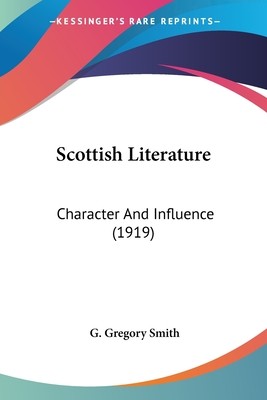
- We will send in 10–14 business days.
- Author: G Gregory Smith
- Publisher: Kessinger Publishing
- ISBN-10: 0548606951
- ISBN-13: 9780548606957
- Format: 15.2 x 22.9 x 1.8 cm, minkšti viršeliai
- Language: English
- SAVE -10% with code: EXTRA
Reviews
Description
Excerpt from Scottish Literature: Character Influence: These ten connected Essays deal with two subjects, the character or habit of Scottish Literature (Chapters I.-V.) and the influence which that literature has exerted on others (Chapters VI.-X.). The book is not offered as a history, though in places, where details are handled in support of the argument, it may assume the manner of narrative. It claims to be mainly critical, and it carries with it the authors confession that he knows how difficult it is to set forth a corporate literary character or to indicate the direction of a literary influence; as it is to win assent to a general judgement, when the survey is so wide, when the proofs are not at all points complete, and when there are prepossessions, not always literary, which decline to be adjusted. Yet the venture seemed worth making, partly because of these risks, but chiefly because the way was untrodden. The author consoles himself that, if his interpretation prove inadequate, he may have served some purpose in reconstituting the evidence.
EXTRA 10 % discount with code: EXTRA
The promotion ends in 21d.17:43:45
The discount code is valid when purchasing from 10 €. Discounts do not stack.
- Author: G Gregory Smith
- Publisher: Kessinger Publishing
- ISBN-10: 0548606951
- ISBN-13: 9780548606957
- Format: 15.2 x 22.9 x 1.8 cm, minkšti viršeliai
- Language: English English
Excerpt from Scottish Literature: Character Influence: These ten connected Essays deal with two subjects, the character or habit of Scottish Literature (Chapters I.-V.) and the influence which that literature has exerted on others (Chapters VI.-X.). The book is not offered as a history, though in places, where details are handled in support of the argument, it may assume the manner of narrative. It claims to be mainly critical, and it carries with it the authors confession that he knows how difficult it is to set forth a corporate literary character or to indicate the direction of a literary influence; as it is to win assent to a general judgement, when the survey is so wide, when the proofs are not at all points complete, and when there are prepossessions, not always literary, which decline to be adjusted. Yet the venture seemed worth making, partly because of these risks, but chiefly because the way was untrodden. The author consoles himself that, if his interpretation prove inadequate, he may have served some purpose in reconstituting the evidence.


Reviews